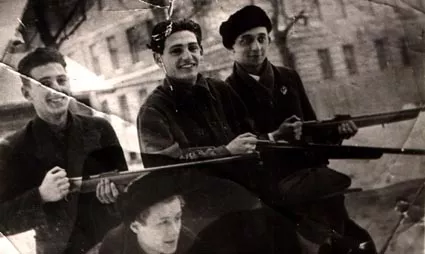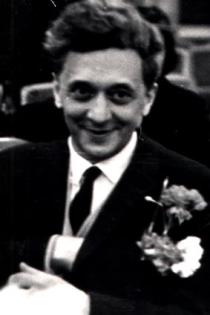Albert Tsessarskiy and his friends
The picture was made during my studies at Medical Institute in 1938 in Moscow. This is shooting class. The last to the right is I , to the left from me is my friend Sasha Fainstein. Dima Vinogradov is lower to us. He was killed in action during Finnish campaign in 1940.
It is difficult to say who impacted my character more. I think that not only my family had influence on me. We, boys and girls, practically stayed on the street. There was a small saw-mill in the neighboring yard. I remember how we, guys, built a hut from the waste wood of the plant. We organized commune there. It meant that all of us snitched the products from home, took them to the commune and shared in equal pieces. In general, I was a convinced communist. The formula itself 'liberty, equality, brotherhood' was so close to my heart that I thought that there could not be anything higher than that. My preparation for school was even good for the 2nd grade. Some teachers taught me as well as kin and acquaintances. I went to the 2nd grade in 1930 of Russian 10-year school. I was a not an excellent, but a good student.
I had a lot of friends at school. All of them were of different nationalities- Jews, Ukrainians, Russians. There was a large caboodle of friends and nobody ever came up with the nationality issue. My bosom friends were 3 boys - Jews Kisa Averbuch, Dusya Marder and a Russian Oleg Shepelyov. Kisa and Dusya went to navy school institute having finished school. When the war was unleashed they were sent in the vicinity of Moscow as marines. Oleg Shepelyov was close to them in evacuation. He was starving. Then he told me that Dusik found him and saw how indigent he was. When Dusik left, Oleg found a wad of money on his table. Dusik left everything he made as an officer. In couple of days he perished. Kisa Aberuch died shortly before him. There were a lot of Jews in my class. We sang and danced to Jewish songs. There I learnt how to dance Jewish dance Freilichs with all 'frills'. It was very organic to me.I was in a drama circle at school and read a lot in the team of the fiction reader. Thus, Ukrainian, Russian cultures mixed up in me.
In 1937 I finished school and I wanted to enter theatrical institute. But I was advised not to do that as I ought to acquire a serious profession so that theatre would be just a hobby. I decided to go to Moscow and enter IFLI (Institute of Philosophy and Literature). I dreamt to become a writer. I passed exams, walked around the institute and was dawned that I it was not something that I needed. I had my documents on me. I thought that I should be closer to people and entered the 2nd Medical Institute, Therapeutic Department.
We had a wonderful team of teachers at the institute. I was very fond of histology, the science of cells. The head of histology chair was Boris Lavrentiev. He was one of the founders of neurohistology. He was deputy rector of the institute, where all medical branches were combined. He was an original man. He was internationalist. He knew foreign languages and loved foreign culture. On his jubilee we did not give him the books written by Stalin, but by Shakespeare. He was happy.
Our teachers were great experts, professionals. They were beyond politics. Our Komsomol Committee [editor's note: Komsomol units existed at all educational and industrial enterprises. They were headed by Komsomol committees involved in organizational activities] consisted of romantic people. I joined Komsomol at the institute. It was natural. I was not involved in social work. I was fond of theatre. There was so-called peoples' theatre in the culture house of medical workers. I played some parts in the performances there and I was a success. On the 19th June 1941 I got an official invitation to the troupe of that theatre. I was in my fourth year. In three days the war was unleashed. Things were predetermined. What kind of theatres was I to think about! I ought to be in the lines.
















